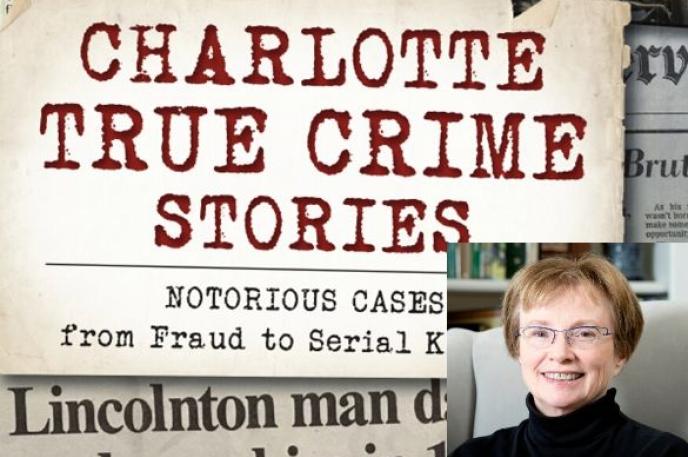
A historical snapshot of crime in Charlotte
January 28, 2020
Would you like to identify a nearby neighborhood street as the scene of a crime? Or learn that your former classmate is now the suspect in multiple murders? Those are the kind of connections one makes when reading Charlotte True Crime Stories: Notorious Cases from Fraud to Serial Killing. The newest book, written by author Cathy Pickens, is the result of crime research of actual events in and around Mecklenburg County.
“I don’t do investigative reporting,” Pickens said. “I’m not knocking on people’s doors. I’m not solving cold cases,” she added.
Her intention, she said, is to provide a series of “short stories” about memorable cases the public knows, typically through a string of newspaper articles. “I want to condense it and tell it in a digestible way,” Pickens said.
Drawing a figurative circle around Charlotte, Pickens covers cases in her book from neighboring Charlotte cities such as Belmont, Concord, and Shelby to name a few. These cases cover a 100-year span, with chapter four alone touching on gang bootlegging, prostitution, drug trafficking and even motorcycle gangs.
One of Pickens favorite stories from the book, which brings a smile when she speaks about it, is the trial of a wife accused of murdering her husband in 1926. As she writes in her book, 19-year-old Nellie Freeman was married to Alton Freeman, a thief and unfaithful husband. One fateful day, she asked him if he loved her while hugging him and he replied, “No.” Unfortunately for him, she had a knife in convenient range and used it on him. A murder trial ensued with the prosecutor determined to get a conviction and buck tradition. Historically, Charlotte juries didn’t convict women of murder. This case did not change that streak as Nellie Freeman was found not guilty by reason of insanity. Even so, she was nicknamed “Razor Girl” by the press during the trial.
Pickens’s venture into true crime followed her interest in writing about it. The previously discussed Nellie Freeman case features a person who committed a crime but afterwards led a quiet, seemingly normal life. Pickens said that many involved in the cases she covered led normal lives.
Another appeal of the true crime genre for Pickens is its strong draw to women readers. “I think some of it is a sense of self-protection,” she said. “If I can figure this out, then I won’t be a victim. I think a lot of it is what attracts me and others—is that we like to solve puzzles,” she added.
True crime stories also look at changes in communities and cities. Pickens wrote in an email, “I wanted the stories to capture Charlotte and what’s formed it and what makes it unique and interesting, seen through this unusual lens of crime.” In her book’s last chapter, Pickens notes that the 1990s population boom, troubling rise of crack cocaine and frighteningly high murder rates dramatically changed the character of Charlotte to reflect big-city problems.
The opportunity for Pickens to publish Charlotte True Crime Stories: Notorious Cases from Fraud to Serial Killing happened quickly after an unsuccessful first attempt at publishing a true crime book. When she offered to write a true crime history book about Charlotte to a book company she successfully worked with 10 years earlier, the company gave a contract in a week. The focus on Charlotte, its crimes and history were the hook. “That just doesn’t happen," Pickens said. "I was off and running,” she added.
Pickens is quick to praise the Robinson-Spangler Carolina Room at Charlotte Mecklenburg Library as a tremendous help. “The resources there are phenomenal, and the staff has been incredibly helpful in bringing out stories that I wouldn’t know about otherwise,” she said. “A lot of the artwork (primarily photography used for the book), and copyright permission, came courtesy of the Library and that would be lost if I didn’t have access to those public resources,” she added. The book is also a culmination of many years collecting crime articles, discussing crime as a mystery convention panelist and writing a true-crime column for Mystery Readers Journal.
Some Library customers may recognize Pickens’s name. In the early 2000s, she began a mystery fiction series featuring an attorney and sleuth set in a small South Carolina town. The Avery Andrews novels mirrored her background as a lawyer and, later, a business professor. Pickens has also worked in higher education. The Library owns three books from the series.
Will Pickens return to fiction writing? It’s very likely. as she said she has a completed a new novel and has another in development. Next up though, this year she has True Crime Stories of Eastern North Carolina scheduled for a spring release from History Press and she wants to write about true crime in her home state of South Carolina.
